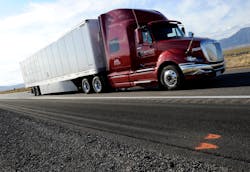EDF: Stringent Phase II GHG rules will cut trucking costs
A new report crafted by the Environmental Defense Fund (EDF) argues that the “Phase II” greenhouse gas (GHG) rules currently being developed by the Environmental Protection Agency (EPA) and National Highway Traffic Safety Administration (NHTSA) for medium- and heavy-duty trucks could boost industry savings if they are more stringent.
The group also believes that increasing the fuel efficiency focus on trailers as part of the EPA/NHTSA GHG Phase II rulemaking process will boost trucking industry cost savings even further.
“While commercial trailers do not have engines, their aerodynamic characteristics and rolling resistance significantly influence the total amount of fuel used by a combination truck-trailer carrying freight,” EDF noted in its analysis. “There is ample evidence that fuel efficiency and greenhouse gas standards applied to new commercial trailers could significantly increase the benefits achieved by more stringent Phase II standards for trucks.”
With respect to freight trucks, the group indicates that tighter fuel efficiency standards will likely cause freight costs to fall.
“There are two opposing effects on freight costs,” EDF said. “First, the standards will increase the cost of new trucks and trailers since additional technologies will be required to meet the more stringent standards. This will tend to increase per-mile freight hauling costs since these incremental equipment costs will need to be recovered.”
On the other hand, the group believes more stringent standards will reduce the amount of fuel required to haul a given amount of freight a given distance, which will reduce per-mile freight costs more than the increase in equipment costs – thus leading to a net reduction in freight costs.
“Fuel is a significant driver of freight costs,” EDF noted. “It is estimated that on average fuel purchases now account for approximately 39% of total freight costs, and that amortization of equipment purchase or lease costs account for an additional 11%.”
In terms of the technology required to meet the Phase II fuel efficiency targets for model year 2020 and 2025 trucks, the group believes several “approaches” will need to be explored:
- Improvements to the aerodynamics of both trucks and trailers;
- Use of low-rolling resistance single-wide dual tires on both trucks and trailers;
- Various engine improvements to reduce engine friction, and improve air handling and heat transfer in the cylinder;
- Use of automated manual transmissions;
- Use of auxiliary power units for overnight idle reduction on sleeper tractors;
- Exhaust waste heat recovery using what’s known as a “bottoming cycle.”
EDF added, however, that carriers will face higher equipment prices in the short term in order to meet tougher fuel efficiency standards.
The group noted in its research that the average purchase price of a new Class 8 sleeper cab-equipped tractor now ranges between $103,000 and $116,000, with the typical purchase price of a new dry van trailer ranging from $22,000 to $27,000 – and it believes stronger Phase II standards and the resultant technological upgrades required to meet them will increase the cost of new trucks by as much as 25%, dry van trailer sticker prices going up by as much as 20%.
About the Author
Sean Kilcarr
Editor in Chief
Sean Kilcarr is a former longtime FleetOwner senior editor who wrote for the publication from 2000 to 2018. He served as editor-in-chief from 2017 to 2018.
